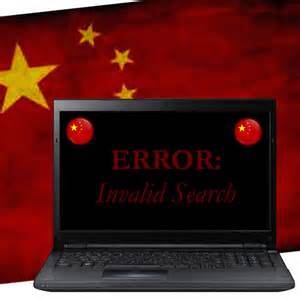Weibo, China’s answer for its American counterpart, Twitter, is largely comprised of Chinese language speakers. In 2012 there were more than 500 million users on the site and about 100 million messages posted daily (Josh Ong, TWN). Today they got one more to add to the stats, a goofy American.
The Chinese version of the site isn’t exactly easy to navigate, even with the additional support of Google Chrome’s attempt at translating the pages, but I figure why not look into it anyways. Though I’m not necessarily a tech-savvy individual, the goings-on in the Chinese blog/web-o-sphere fascinate me.
I’ve written once before about aspects of China’s censorship issues on this blog, and sure enough, Weibo hasn’t escaped unscathed in the Middle Kingdom’s war on the combating of “inciting rumors,” as they like to refer to it. Last year in the news, the govt. said that they would require all users to register with their real name and even their ID number (http://asia.cnet.com/blogs/foreign-users-of-weibo-in-confusion-as-chinas-real-name-deadline-looms-62213416.htm). Quite understandably so, most people were a little miffed about this.
This change in the registration process was supposed to take place last March, but if you checked out the linked article, you’ll see that foreigners with our damn foreign names were in somewhat of a Weibo purgatory, a Weiburgatory, if you will. And even now there are still stirrings saying the policy could take place. Will my profile be frozen or blocked? Will I—Intrepid_Nomad (my Weibo Nickname)—be another of the site’s statistical burps? Or will I be able to hang around the site and play a while?
It’s not like I’m planning to spread dissent throughout the ranks of the microbloging netizens or anything fancy like that. Since joining a few days ago, I’ve only made a few innocuous posts about beginning work again, and I posted a few photos from trips in China I’ve taken. Within minutes the posts were viewed about a hundred times each, and the numbers keep changing, but I doubt any of the thousands or so full-time Censors are counted among those views. Most likely the posts didn’t even illicit a beep from the keyword software Weibo and the Great Chinese Firewall use to monitor searches and the publishing of sensitive content. Well, one of the tags I have is “American,” so…Yeah, maybe they’ve started their dossier.
Keyword recognition software being used for censorship isn’t new, and isn’t even particularly Chinese, but it is used quite a bit here. As anyone in China can attest, most Western social networking sites are blocked. Facebook and WordPress, Twitter and Tublr—you ain’t surfin’ them unless you’ve got yourself a VPN. But of course it isn’t just these sites that are blocked. No, as Econsultancy writer Ben Davis points out, on any given day in China you can’t freely peruse topics that pertain to:
…Chinese politics (human rights etc), socially sensitive content (pornography, gambling etc), people (dissidents), sensitive events, technology (spyware, URLs etc) and other miscellaneous topics.
As you can see, these are pretty general topics that most Americans or web users routinely look up. In China, though, looking up any political leader can get you a slap on the wrist. Checking in on Tibetan protests might do more than slow your internet connection speed. Claiming affiliation with a known activist group or promoting religious views—total no nos.

That being said, people are crafty. Chinese netizens are sly and still do talk about all of these topics, just not in obvious ways. The Grass mud horse (Cao ni Ma—in pin yin) is a great icon for the Chinese blogger who wants complete freedom of speech. A homophone for “mother fucker,” the meme became the animal of the Censorship Fighter on the Chinese net a few years ago. It’s still around, too.
Using the Chinese characters for 6 and 4, people have been able to write and search for info on the June fourth Tiananmen incident. Using euphemisms so veiled that even fluent Mandarin speakers aren’t always sure of their meaning, ideas are passed around and the Great Fire Wall is hopped over like a backyard fence.

Even with censors, in 2011 Weibo was used in a way that even Wikileaks would be proud of. When a high-speed train collision in Wenzhou that killed 40 people was being swept under the rug Weibo users took to the net and lambasted the government for the cover-up. People were criticizing the government’s actions on a scale never before seen in China, and people realized it. Information was spread.
Weibo didn’t remain so open, though. It has been, like all of the Chinese Internet, subject to severe and speedy censorship. Even after the “Real Name” policy got put on hold due to the outpouring of user (domestic and international) criticism, the censors didn’t go away. In recent months, though, that censorship is changing. According to Jason Q. Ng at Tea Leaf Nation, “Through the testing of searches of key “sensitive” terms on the site, it has become clear that some previously-blocked search terms now return results.”
He goes on to squash the celebration by saying that the strategy has changed, not the end goals. These “results” are heavily filtered, sanitized, and censored. Now you can pull up info on June 4th, Xi Jingping, and a few other “sensitive issues,” but what you’re getting isn’t objective answers. Jason Q. Ng sums it up nicely by saying,
Before, Chinese users knew when their results were extra sensitive (most, if not all, Chinese users are aware that censors routinely work behind the scenes to delete sensitive posts), yet the new changes – combined with other tactics documented by GreatFire like only showing search results from verified users for certain terms and delaying posts from appearing in search results – create even more uncertainty as to the boundaries of discourse online, perhaps encouraging greater self-censorship by users. What is and is not off-limits has now become slightly harder to determine – another step in making censorship invisible and all-pervasive.
In a country with the insane population numbers of China, the uneducated are a large demographic. Rumors that start on the net can spread and cause serious damage if not monitored. Those who have no way of forming their own views can be guided to think and believe just about anything. It’s happened all around the world before, and it’ll probably happen again. I suppose I get that, to an extent. A country does have to have the ability to be objective, and if that means admitting to itself that your citizens are too incompetent to make informed decisions, than that’s one thing. Some of the censorship in China is up this alley.

But not all, or even most of it. When you take away objective, educated journalism or news, that’s when the fit hits the shan. Now they’re taking it further and doing a form of “reeducation” by allowing searches that produce authorized results. People notice these things. They’re treated like sheep, but not all of them follow the shepherd so closely.
And the truth is: people here are curious. Hell, they’re more than curious. I’ve spoken to Masters students who have aired the issues they have with Chinese censorship, and I’ve seen the looks my Business Education students have given one another when the conversation has strayed into territory that is not supposed to be discussed openly.
The government knows its people are restless, too. In 2004-2006 a talent show called with the English name Super Girl allowed people to call in a vote for their favorite contestant. The show was a lot like American Idol, and it had viewers tuning in in the hundreds of millions. The democratic one-call, one-vote platform was too much, though. Chinese officials cancelled the show, and even its second reincarnation, Happy Girls. The official reasons were due to timing issues and the “risqué” nature of some of the episodes, but it was pretty obvious when it got the axe that seeing such a large percentage of its citizens taking part in something so democratic was not what China wanted (China Cancels Talent Show ‘Happy Girl’ For Being Too Democratic, Business Insider).
Linette Lopez’s article for Business Insider had another great quote, too, “Some people sight that if only we could vote in Chinese elections, as we do in ‘Happy Girl’, then we’d lock horns and join the contest…This is the truly sensitive issue.”
The people know all the faults in their system, and people in other countries are foolish if they think otherwise.
That’s just it, though: it’s their system.
Living in China for a few years does not make me any closer to being Chinese. Learning the language will not grant me the Golden Ticket into this culture. Joining Sino Weibo and having a WeiXin account does not give me any sort of street cred. It does, however, give me a more scenic seat.
In her recent book, “People’s Pornography: Sex and Surveillance on the Chinese Internet” Katrien Jacobs sheds a lot of light on the interesting worlds surviving and thriving behind the Great Fire Wall on the net. The Chinese people may seem docile and complacent in the face of an oppressive, secretive, and Big government, but that is only what they appear to be. They are quite a bit more. Their lot has forced them into challenging the system in unique and unorthodox ways, and, yes, many have taken large gulps of the Mao Era Cool-Aid, but there 300 million bloggers (about the population of the entire US) out there trying to find something of an individual identity. Some are whispering and others shouting. There are the voyeurs and the voices, the loners and the leaders, and they are pushing against the boundaries that have been placed around them.
It’s going to be interesting to see how much pressure the “Great Fire Wall” can take when the people inside it are pressing against it, trying to get out. Will it stand the test of time like The Great Wall, or come tumbling down like the one in Berlin?
I’m just hoping that doing research for this entry without my VPN doesn’t get me deported and my new Weibo account deleted.

Censorship article: http://blogs.wsj.com/chinarealtime/2013/08/30/an-inside-look-at-chinas-censorship-tools/
Josh Ong article: http://thenextweb.com/asia/2013/02/21/chinas-sina-weibo-grew-73-in-2012-passing-500-million-registered-accounts/
Jason Q. Ng article: http://www.tealeafnation.com/2013/06/its-confirmed-weibo-censors-are-treating-non-chinese-users-differently/
Weibo “names” article: http://asia.cnet.com/blogs/foreign-users-of-weibo-in-confusion-as-chinas-real-name-deadline-looms-62213416.htm
Davis article: http://econsultancy.com/blog/63150-censorship-or-surveillance-which-keywords-are-flagged-in-china
Linette Lopez article: http://www.businessinsider.com/china-cancels-talent-show-because-its-too-democratic-2011-9

